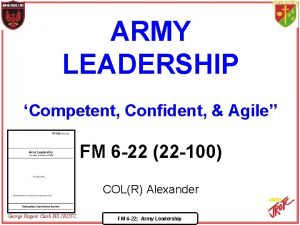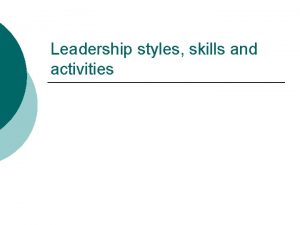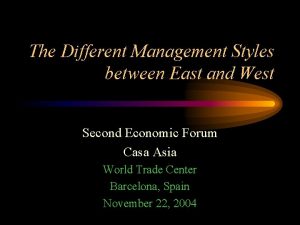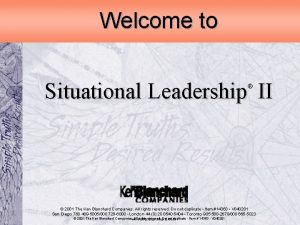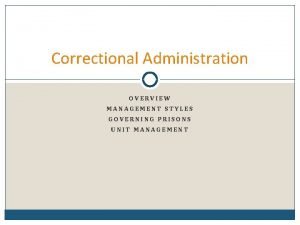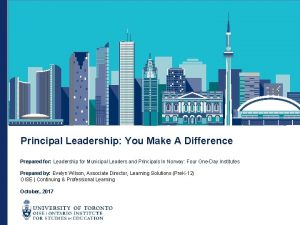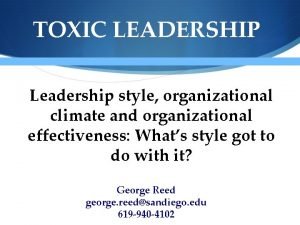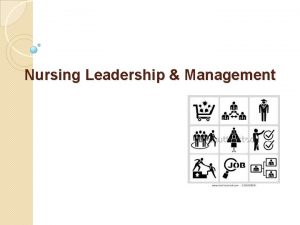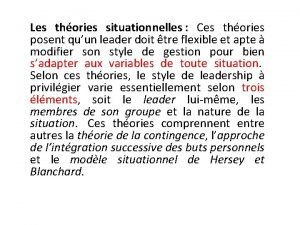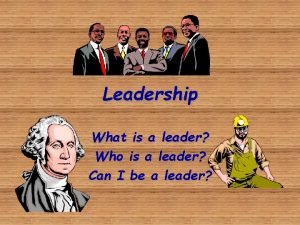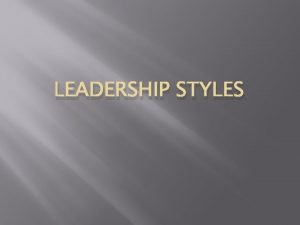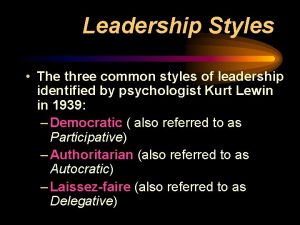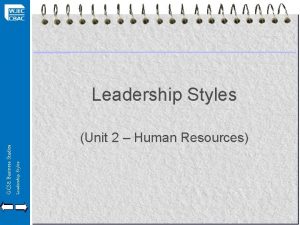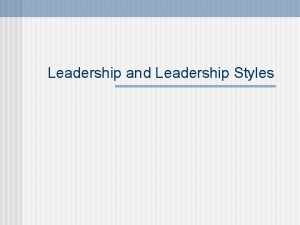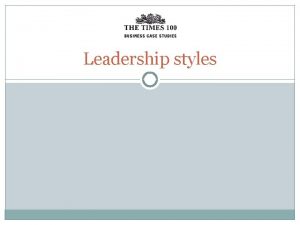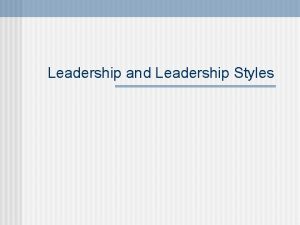Leadership Styles GPP 3 O Mrs Austin If




























- Slides: 28

Leadership Styles GPP 3 O Mrs. Austin

“If your actions inspire others to dream more, learn more, do more and become more, you are a leader. ” John Quincy Adams

• Leader: A leader is an individual, who significantly affects the thoughts, feelings, and/or behaviours of a number of individuals. • There are many different kinds of people, all with different ways of leading others. • This portion of the lesson will focus on defining the different ways that people lead. • Most people can be divided into having one of nine possible leadership styles. No one style makes a better leader or reflects a higher degree of capability than any of the other styles.

• • • Perfectionist Helper Motivator Innovator Thinker Partner Enthusiast Advocate Diplomat The leadership styles that will be discussed in this lesson include:

• Very few people will match all of the characteristics of their leadership style; however, they do give a rough indication into the way that a person leads. • Different people who have the same leadership style will not necessarily be exactly the same or act in a similar way.

• There are large degrees of variation amongst people with the same leadership style, due to different life experiences and personalities. However, a person's basic leadership style, just • like their basic personality, will remain the same throughout life – it is only possible to develop • and improve that particular style over time. • "Leadership has a harder job to do than just choose sides. It must bring sides together" Jesse Jackson

• The leadership styles are divided based on an individual's driving force or motivations, not on their actual behaviour. Therefore, if you were to read a description of the behaviours of people with the different leadership styles, you may see yourself in more than one of them – but in reality only one suits you best. • The nine leadership styles differ in: • Driving force or motivation • Behaviours arising from the driving force • Reaction to stress • Development of needs These four points are the criteria used to differentiate between the nine styles.

The 9 Styles of Leadership

Do you feel the need to fix things? Are you focused on high standards, quality and ideals? Are you angry when others do a poor job? • A perfectionist can be a wonderful leader; tolerant, balanced and focused on excellence. • They lead by setting an example for their followers. They have high personal goals and expect others to live up to the same standards. • When their leadership skills are less well-developed, however, perfectionists tend to be overly perfectionist. Often, they have an internal judging voice, which chastises themselves or others for falling short of perfection. Style 1: The Perfectionist "I'm my own worst critic"

• This same internal voice can also serve to be in a healthy individual, a motivation to learn from mistakes and do better the next time. • Typically, Style One leaders need improvement in: • Reducing destructive self-criticism • Accept conditions that do not conform to one's ideal

• Are you focused on service, relationships, helping? Do you sometimes lose yourself by taking care of others? • The most interpersonally oriented of all the leadership styles, helpers are unconditionally caring leaders who derive deep satisfaction from seeing and encouraging the development of others. Well-developed helpers will also be aware of their own needs, which provide balance in their lives and allow them to give freely, without expectation of return. Style 2: The Helper "Was that helpful? "

• Because of their desire to be of assistance, they tend to be in the middle of things, giving help and advice whether others want it or not. • Typically, Style Two leaders need improvement in: • Looking after their own needs • Staying out of others' personal boundaries

• Do you have a stronger drive to succeed than most? Are you competitive, focused on • efficiency, goals, and marketing yourself? • Motivators are often risk-taking go-getters who ensure high achievements for their team or group. They are efficient and very goal-oriented; as a result, they tend to rise to the top of any group they are in. Style 3: The Motivator "I like seeing success”

• Under-developed motivators are often seen as showboating, or “stealing the spotlight”, and can easily offend others, who feel that their contributions are not being properly acknowledged. • They show themselves at the expense of the team • Typically, Style Three leaders need improvement in: • Learning to work with others • Acknowledging the contributions of others

• Are you focused on what's missing, what would be better if different? Are you moody, do you have trouble getting past your melancholy? • Innovators are vital to the health of a team because they are able to view things from a new slant and are not bound by tradition. More in touch with their feelings than other types, they are in danger of sinking into unhappiness if they meet with resistance to their ideas. #4 The Innovator "I seem to see things differently than others"

• The same talent that allows innovators to "look outside the box" can lead them to wonder why they never see things the way others do, and subsequently to question if they are flawed. • Typically, Style Four leaders need improvement in: • Learn to develop current possibilities, instead of always thinking about future possibilities that may never come • Overcome dissatisfaction

• Are you somewhat reserved, a deep thinker who's focused on gaining knowledge? Do you • tend to withdraw from others' emotions? • Thinkers are the most independent of the nine styles, and prefer to be in a team with capable people who need no direction or instructions. Although thinkers can be thoughtful and loving people, they tend to put little emphasis on the role of emotions. Style 5: The Thinker "I have a good mind and I'm pretty perceptive"

• Well-developed thinkers can be skilled strategists because of their ability to take in the whole picture and integrate its components in creative ways. They are more capable than most of influencing others through their knowledge. • Typically, Style Five leaders need improvement in: • Acknowledging others efforts • Using emotions

• Are you a good contingency planner, focused on what could go wrong? Do you second guess your own decisions sometimes? • Partners at their best are highly team-oriented leaders who bring out the best in everyone. • These are energetic people who care about the needs of others in the group. • Style six leaders, however, are often more focused on preventing something from going wrong than on making sure things are going right. Styl e 6: The Partner "All my life, I've questioned my own ability"

• This kind of leader is almost certain to hold everyone accountable for their actions, but also worries a great deal about making mistakes themselves. They may be hesitant to make a big decision for fear of it being wrong. • Typically, Style Six leaders need improvement in: • Focusing on opportunities instead of worries • Reducing their amount of fear

• Are you primarily enthusiastic, focused on the future and the possibilities? Do you avoid the nitty-gritty details? • Highly evolved enthusiasts are the group's cheerleaders because of their natural optimism. • They focus on the long-term view and possibilities. Style seven leaders often put large focus on equality within the group. Style 7: The Enthusiast "I always see the bright side of things"

• Unfortunately, enthusiasts tend to center only on good news and often do not pay enough attention to bad news, which can allow problems to get bigger. • Typically, Style Seven leaders need improvement in: • Dealing with problems • Paying attention to detail

• Are you usually the one in charge, a highly responsible person who doesn't feel comfortable • showing weakness? • Advocate leaders who have paid attention to developing their leadership skills are able to shoulder big responsibilities without having to control everything. Advocates are usually soft hearted and self-confident, which inspires loyalty in their followers. Style 8: The Advocate I have a hard time asking for help - I'll just do it myself"

• Unfortunately, style eight leaders can be seen as being overly dominant because it is difficult for them to trust anyone enough to show any weakness or vulnerability. They tend to do things their way, and have difficulty seeing situations from others' perspectives.

• Typically, Style Eight leaders need improvement in: • Putting themselves in others' shoes • Developing trust in others

• Do you seek consensus, cooperation? Do you tend to see all viewpoints, preferring not to be in the spotlight? • Diplomats like to bring cooperation to any group or team; they are dealing with others' problems and build consensus. They have a natural tendency to respect diversity, and can get along with almost anyone. • Taking a strong position is particularly difficult for style nine leaders, because they like to see all sides of an issue, and it is hard for them to focus on one topic at a time. Style 9: The Diplomat "I 'm pretty easy-going”

• Diplomats often are out of touch with their own wishes, as they are most concerned with the • needs of others in the group. • Typically, Style Nine leaders need improvement in: • Setting priorities • Staying focused

• Reflection Assignment • You have read about the 9 Styles of Leadership. Choose 2 of these styles that seem to fit you well. • Explain in detail why you fit these 2 styles, giving some examples to support your choices
 They are mrs garcia and mrs castro
They are mrs garcia and mrs castro Mrs. darling was ___________ of mrs. s.
Mrs. darling was ___________ of mrs. s. They are mrs garcia and mrs castro
They are mrs garcia and mrs castro Jack ma leadership traits
Jack ma leadership traits Daniel goleman leadership styles
Daniel goleman leadership styles John maxwell leadership styles
John maxwell leadership styles Army leadership requirements model
Army leadership requirements model Leadership style activities
Leadership style activities 3 main types of leadership styles
3 main types of leadership styles Contemporary leadership styles
Contemporary leadership styles Pedagogical leadership skills
Pedagogical leadership skills North, south east west leadership styles
North, south east west leadership styles Leadership styles business a level
Leadership styles business a level Studi kepemimpinan iowa
Studi kepemimpinan iowa The ken
The ken Leadership styles in correctional facilities
Leadership styles in correctional facilities Types of leadership styles
Types of leadership styles Connective leadership styles
Connective leadership styles North south east west leadership styles
North south east west leadership styles Principal leadership styles
Principal leadership styles Leadership in occupational therapy
Leadership in occupational therapy Kurt lewin leadership styles
Kurt lewin leadership styles Pmi leadership styles
Pmi leadership styles Goleman leadership styles
Goleman leadership styles Toxic leadership styles
Toxic leadership styles Nursing leadership theories
Nursing leadership theories Toastmasters leadership styles
Toastmasters leadership styles Les styles de leadership selon hersey et blanchard
Les styles de leadership selon hersey et blanchard Leadership styles
Leadership styles






